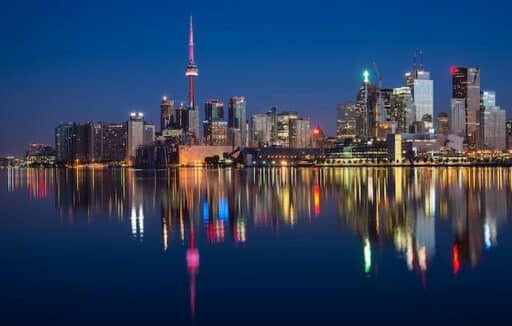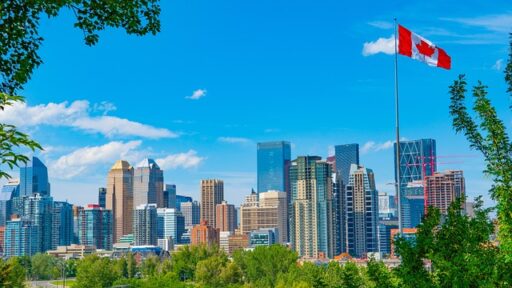Sitemap: Living abroad > Living in Canada
Are you considering making a smart financial move and investing in Canada? Look no further – this comprehensive guide will provide you with all the information you need to know about investments and living in the Great White North.
This page will tackle the following topics:
- Living in Canada 101
- Is Canada a Good Place to Live?
- Canadian Economy
- Doing Business in Canada for Expats
- Cost of Living in Canada
- Culture and Life in Canada
- Best Places to Live in Canada
- Moving to Canada: How to get a Canadian visa
If you are looking to invest as an expat or high-net-worth individual, which is what I specialize in, you can email me (advice@adamfayed.com) or WhatsApp (+44-7393-450-837).
Living in Canada 101
Is Canada a good place to live?
Living and investing in Canada offers a blend of opportunities and challenges, shaped by its unique economic and geopolitical landscape. On the one hand, Canada’s stable economy, rich natural resources, and diverse industries present attractive investment opportunities.
The country’s economic stability is underpinned by a strong banking system and sound fiscal policies, making it a safe haven, especially during global economic uncertainties. Its wealth in natural resources like oil, gas, minerals, and timber, coupled with a robust manufacturing, technology, and service sectors, diversifies investment options.
Canada’s strategic location next to the United States, the world’s largest economy, facilitates significant trade and investment opportunities, bolstered by the US-Canada trade relationship, one of the strongest globally.
Moreover, Canada’s highly educated and skilled workforce is a boon for knowledge-based industries, while its reputation for innovation, particularly in technology, environmental sciences, and biotechnology, is supported by government incentives for research and development.
The country’s numerous trade agreements, including the USMCA, open up vast markets. Canada’s high standard of living, political stability, and favorable immigration policies further enhance its attractiveness as an investment destination.
The growing tech sector, particularly in cities like Toronto, Vancouver, and Montreal, offers burgeoning opportunities in areas like AI and clean technology. Additionally, Canada’s focus on sustainable and environmentally friendly practices opens up investment avenues in green technology and renewable energy sectors.
Also among the benefits of living in Canada is a safe and welcoming environment, with low crime rates and a diverse population that embraces multiculturalism. The country’s commitment to universal healthcare ensures access to quality medical services, making it an attractive option for retirees seeking peace of mind.

Canada’s relatively high tax rates might affect net investment returns, and its real estate market has experienced significant price fluctuations in some cities. Labor market challenges, including shortages in certain sectors, can lead to increased labor costs.
Additionally, Canada’s market size, though significant, is smaller compared to larger economies, potentially limiting growth opportunities for certain investments.
The most relevant and important details for investors to consider are Canada’s economic stability and natural resource wealth, which provide a solid foundation for investment. The close economic ties with the United States are a double-edged sword, offering immense opportunities but also exposing Canada to external economic shocks.
The high standard of living and political stability are significant positives, contributing to a favorable business environment. However, the challenges of high taxation, regulatory changes, and potential labor market shortages require careful consideration and strategic planning.
For international investors, understanding the impact of exchange rate fluctuations and the nuances of the Canadian market is crucial.
Related content:
Canadian Economy
To make informed investment decisions in Canada, it’s crucial to have a basic understanding of the country’s economy. Canada has a mixed-market economy, characterized by strong private-sector activity and government intervention in key areas. The country is rich in natural resources, including oil, gas, minerals, and timber, which play a significant role in its economy.
Canada is also a major exporter, with trade partnerships around the world. The United States is Canada’s largest trading partner, followed by China, Mexico, and the United Kingdom. The country’s trade relationships contribute to its economic stability and provide opportunities for investors looking to tap into global markets.
When investing in Canada, it’s important to keep an eye on key economic indicators such as GDP growth, inflation rates, and unemployment. These indicators can help investors gauge the health of the economy and make informed decisions about their investments.
Doing Business in Canada for Expats
Canada’s government has implemented programs and incentives to attract foreign investment and stimulate economic growth.
In addition to government programs, international investors can explore various sectors for investment opportunities.
Investing in Canadian tech startups can provide significant returns and be a part of the country’s innovation-driven economy.
Natural resources, such as oil, gas, and minerals, also present investment opportunities for international investors. Canada is rich in these resources and has a well-established industry that contributes to its economic growth.
Tax Considerations for Investors in Canada
Before investing in Canada, it’s essential to understand the tax implications of your investments. Canada has a progressive tax system, which means that higher-income individuals are subject to higher tax rates. The federal government and provinces levy income taxes, and each province has its own tax rates.
In addition to income tax, investors in Canada may also be subject to capital gains tax. Capital gains tax is applied to the profit made from selling an investment, such as stocks or real estate. The tax rate for capital gains depends on various factors, including the type of investment and the length of time it was held.
To optimize your tax situation, it’s advisable to consult with a tax professional who specializes in Canadian tax law. They can help you navigate the complexities of the tax system and ensure that you are in compliance with all applicable tax regulations.
Related content:
Canadian Expat and Nomad Taxes: Changes Coming
Best Places to Invest in Real Estate in Canada
Are There Resources for Investors in Canada?
Navigating the investment landscape in Canada can be overwhelming, especially for international investors. Fortunately, there are resources available to help investors make informed decisions and access the support they need.
One such resource is the Canada Business Network, a government-funded initiative that provides information and resources for entrepreneurs and investors.
The Canada Business Network offers guidance on starting and running a business, accessing financing, and understanding the regulations and requirements for investing in Canada.
Another valuable resource is the Investment Industry Regulatory Organization of Canada (IIROC). The IIROC is a self-regulatory organization that oversees investment dealers and trading activity in Canada. They provide investor protection and ensure that the investment industry operates in a fair and transparent manner.
Additionally, investors can seek advice from financial advisors and investment firms that specialize in Canadian investments. These professionals can provide personalized guidance based on their expertise and help investors navigate the complexities of the Canadian investment landscape.
Cost of Living in Canada
Understanding the cost of living in Canada is crucial for planning your budget. While the cost of living varies across the country, certain expenses remain consistent.
Housing is typically the largest expense, with prices varying depending on the city and neighborhood. Other costs to consider include healthcare, transportation, groceries, and entertainment. It’s important to research and compare prices in different locations to ensure your income or savings will comfortably cover your expenses.
Additionally, familiarize yourself with the tax system, as it varies depending on the province and your income level.
The cost of living in Canada varies significantly across regions. Housing is often the largest expense, with cities like Vancouver and Toronto being particularly expensive.
Daily expenses, including utilities, groceries, and transportation, also vary based on location and lifestyle. For those not covered by public healthcare, private health insurance can be a significant additional expense.
Related content: Living in Canada: Costs – What to Know as an Expat Moving
Healthcare in Canada
Canada’s healthcare system is known for its accessibility and high quality. The country provides universal healthcare coverage to all its residents, ensuring that everyone has access to essential medical services. This comprehensive coverage includes doctor visits, hospital stays, and prescription medications.
Additionally, Canada offers a range of social services, such as unemployment benefits, child care subsidies, and senior care programs. These services contribute to Canada’s high standard of living and make it an attractive destination for individuals and families.
Canada’s healthcare system is universally acclaimed for its public funding and comprehensive coverage of essential medical services, including doctor’s visits and hospital care.
However, it’s important to note that the system does not universally cover services like prescription medications, dental care, and vision care, which might necessitate private insurance. While the quality of healthcare is generally high, accessibility can vary, with rural areas sometimes experiencing longer wait times for certain procedures.
Expats, particularly those with temporary status, may need private health insurance, as immediate eligibility for public healthcare isn’t always granted. Retirees should consider the proximity and accessibility of healthcare facilities when choosing their place of residence.
Culture and Life in Canada
Immersing yourself in Canadian culture and lifestyle is an enriching experience. Canada is known for its friendly and polite citizens, who value diversity and inclusivity.
The country’s cultural scene is vibrant, with numerous festivals, museums, and theaters showcasing the talents of Canadian artists. From ice hockey games to maple syrup festivals, Canadians take pride in their traditions and celebrate their heritage.
Embracing Canadian customs and traditions will help you integrate into the community and build meaningful connections with locals.
Canada offers a plethora of activities and attractions for retirees seeking a fulfilling and active lifestyle. With its vast natural landscapes, retirees can enjoy hiking, fishing, golfing, and skiing in some of the most breathtaking locations in the world.
Additionally, Canada’s cities provide a wide range of cultural experiences, including art galleries, theaters, and culinary delights.
Retirees can also take advantage of various community programs and organizations that offer social events, educational opportunities, and volunteer work. Whatever your interests may be, Canada has something to offer for every retiree.
Canada offers an abundance of opportunities and experiences for individuals looking to live or retire here. From its strong economy and high standard of living to its diverse culture and stunning natural landscapes, Canada has something to offer for everyone.
By understanding the visa and immigration process, choosing the right province or city, and considering the cost of living and healthcare, you can make an informed decision about starting a new chapter in this beautiful country.
Remember to embrace Canadian culture and take advantage of the wide range of activities and attractions available, and don’t forget to plan your finances and tax considerations for a secure and comfortable retirement.
Best Places to Live in Canada
Canada is a vast country with diverse provinces and cities, each offering unique opportunities and lifestyles. When deciding where to live or retire in Canada, consider factors such as job prospects, cost of living, climate, and cultural amenities.
Cities like Toronto and Vancouver are vibrant and multicultural, with thriving arts scenes and a wide range of career opportunities.
On the other hand, smaller cities like Halifax and Victoria offer a more laid-back lifestyle and stunning natural surroundings. Researching and visiting different provinces and cities will help you find the perfect place that aligns with your preferences and goals.
Toronto
If you are an expat, investor, or retiree looking for a vibrant metropolitan setting, you should definitely check out Toronto, the biggest city in Canada.
Toronto, as the country’s financial and commercial center, provides unrivaled prospects in fields such as real estate, technology, and banking. Investors might find residential and commercial property opportunities in the city’s strong real estate market.
Retirees love the city’s cultural amenities, such as museums, theaters, and a wide variety of restaurants, and expats love the abundance of job prospects in its broad economy. People from all over the globe will find a welcoming environment in Toronto, thanks to its multicultural fabric.
Vancouver
With its picturesque landscapes and strategic location as a gateway to the Asia-Pacific region, Vancouver stands out as an exceptional investment destination. This area’s real estate market is appealing due to its long-term appreciation potential, despite its high price tag.

The city’s advantageous trade position and the success of industries like technology and tourism make Vancouver an attractive investment destination.
The city’s magnificent surroundings, pleasant climate, and plenty of outdoor activities contribute to an extraordinarily high quality of life for many expats.
Retirees in Vancouver can enjoy a laid-back lifestyle with easy access to the city’s amenities as well as its many natural attractions, such as scenic walks along the coast and challenging treks in the mountains.
Montreal
If you value a bustling cultural life with reasonable housing, then Montreal is the one for you. The city is famous for its historical charm and lively culture. The city is a great choice for expats and retirees due to its reduced cost of living in comparison to Vancouver and Toronto.
Known as a center for aerospace and design, Montreal is also home to a thriving innovation ecosystem, which attracts investors.
Residents and visitors alike can enjoy a high standard of living thanks to the city’s many festivals, vibrant arts scene, and world-class restaurants.
Furthermore, for anyone seeking to fully embrace a French-speaking culture in North America, Montreal’s bilingual atmosphere is ideal.
Calgary
If you are looking for possibilities in the energy sector, Calgary is a great place to be. It is sometimes called the energy capital of Canada.
Despite the city’s reliance on oil and gas, the economy is beginning to diversify, opening doors to possibilities in renewable energy and technology. This period of economic change can be quite profitable for investors.
Opportunities for expats working in the energy and technology industries might be rather lucrative. With its affordable housing, close proximity to the Rocky Mountains, and excellent level of living, Calgary is a popular destination for retirees compared to Vancouver and Toronto.
Ottawa
Ottawa, as the capital of Canada, provides a safe and secure atmosphere for retirees, foreigners, and investors. Aside from the expanding tech and healthcare industries, the city’s economy is supported by the public sector.
Opportunities in the real estate and government-related businesses may present themselves to investors. Museums, festivals, and the city’s great public services contribute to its high quality of life, which is highly regarded by expats.
The laid-back vibe, diverse culture, and easy access to healthcare in Ottawa make it a great option for retirees.
Halifax
Atlantic Canada’s largest city, Halifax, has a thriving economy and a distinct nautical character. New investment opportunities are opening up in the city as it develops into a center for sectors such as clean energy, life sciences, and maritime technology.
The welcoming locals, breathtaking scenery, and affordable housing options all appeal to expats. Halifax provides seniors with a tranquil way of life, close proximity to medical facilities, cultural activities, and the breathtaking Atlantic coast.
Canada’s diverse cities offer a range of opportunities for expats, investors, and retirees. Whether it’s the economic dynamism of Toronto, the natural beauty of Vancouver, the cultural richness of Montreal, the energy-driven economy of Calgary, the political stability of Ottawa, or the maritime charm of Halifax, each city has its unique appeal.
Prospective expats, investors, and retirees should consider their personal and financial goals when choosing the Canadian city that best suits their needs.
Related content:
18 Cheapest Cities in Canada to Live In
12 Best Places to Live in Canada in 2023
Living as a Digital Nomad in Canada: Best Cities
Moving to Canada: How to Get a Canadian Visa
Before you can embark on your new life in Canada, it’s essential to understand the visa and immigration process.

Canada offers various immigration programs, including the Express Entry system, which is designed to fast-track the entry of skilled workers. To qualify, you must meet certain criteria, such as age, education, language proficiency, and work experience.
Additionally, there are programs specifically tailored for entrepreneurs, investors, and students. Navigating the immigration process can be complex, but with the right guidance and preparation, you can make your dream of living in Canada a reality.
Understanding Canada’s immigration policies is crucial for expats. The country offers various pathways for immigration, including the Express Entry system for skilled workers, which is points-based and considers factors like age, education, and language proficiency.
Provincial Nominee Programs allow provinces to nominate individuals, and there are specific programs for entrepreneurs and investors, although the Federal Investor Program has been discontinued. Notably, Canada does not have a specific retirement visa, so retirees typically immigrate through other available categories.
Related content:
Canadian Temporary, Permanent Residency, and Citizenship
What is the Canada Start-Up Visa Residence Program?
Key Takeaways
Investing in Canada offers a wealth of opportunities for both domestic and international investors. With its stable economy, diverse investment options, and high standard of living, Canada provides a favorable environment for financial success and a fulfilling life.
Whether you’re interested in real estate, stocks, or starting a business, Canada has something to offer. By understanding the Canadian economy, considering tax implications, and following proven investment strategies, you can increase your chances of success.
Moreover, living in Canada as an investor provides access to world-class healthcare, education, and a multicultural society. The country’s welcoming environment and diverse culture make it an ideal place to call home.
So, whether you’re looking to make smart financial investments or embark on a new adventure in life, Canada has it all. Take advantage of the opportunities available and start your journey towards financial success and an enriching new life in the Great White North.
Pained by financial indecision?

Adam is an internationally recognised author on financial matters with over 830million answer views on Quora, a widely sold book on Amazon, and a contributor on Forbes.

